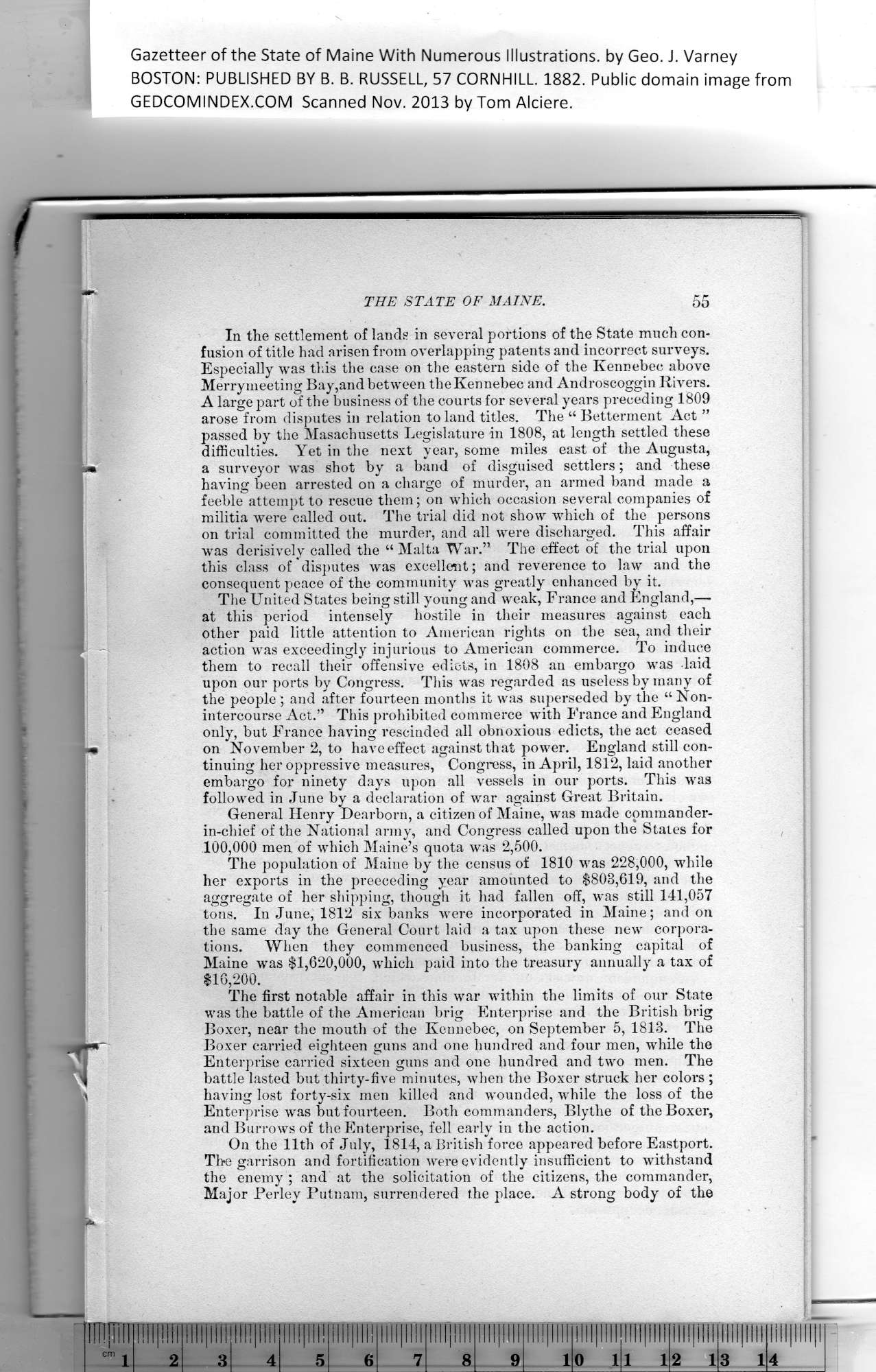|
Gazetteer of the State of Maine With Numerous Illustrations, by Geo. J. Varney
BOSTON: PUBLISHED BY B. B. RUSSELL, 57 CORNHILL. 1882. Public domain image from
THE STATE OF MAINE.
In the settlement of lands in several portions of the State much con-
fusion of title had arisen from overlapping patents and incorrect surveys.
Especially was this the case on the eastern side of the Kennebec above
Merrymeeting Bay,and between the Kennebec and Androscoggin Rivers.
A large part of the business of the courts for several years preceding 1809
arose from disputes in relation to land titles. The “ Betterment Act ”
passed by the Masachusetts Legislature in 1808, at length settled these
difficulties. Yet in the next year, some miles east of the Augusta,
a surveyor was shot by a band of disguised settlers; and these
having been arrested on a charge of murder, an armed band made a
feeble attempt to rescue them; on which occasion several companies of
militia were called out. The trial did not show which of the persons
on trial committed the murder, and all were discharged. This affair
was derisively called the “Malta War.” The effect of the trial upon
this class of disputes was excellent; and reverence to law and the
consequent peace of the community was greatly enhanced by it.
The United States being still young and weak, France and England,—
at this period intensely hostile in their measures against each
other paid little attention to American rights on the sea, and their
action was exceedingly injurious to American commerce. To induce
them to recall their offensive edicts, in 1808 an embargo was laid
upon our ports by Congress. This wras regarded as useless by many of
the people ; and after fourteen months it was superseded by the “ Non-
intercourse Act.” This prohibited commerce with France and England
only, but France having rescinded all obnoxious edicts, the act ceased
on November 2, to have effect against that power. England still con-
tinuing her oppressive measures, Congress, in April, 1812, laid another
embargo for ninety days upon all vessels in our ports. This was
followed in June by a declaration of war against Great Britain.
General Henry Dearborn, a citizen of Maine, was made commander-
in-chief of the National army, and Congress called upon the States for
100,000 men of which Maine’s quota was 2,500.
The population of Maine by the census of 1810 was 228,000, while
her exports in the preeceding year amounted to $803,619, and the
aggregate of her shipping, though it had fallen off, was still 141,057
tons. In June, 1812 six banks were incorporated in Maine; and on
the same day the General Court laid a tax upon these new corpora-
tions. When they commenced business, the banking capital of
Maine was $1,620,000, which paid into the treasury annually a tax of
$16,200.
The first notable affair in this war within the limits of our State
was the battle of the American brig Enterprise and the British brig
Boxer, near the mouth of the Kennebec, on September 5, 1813. The
Boxer carried eighteen guns and one hundred and four men, while the
Enterprise carried sixteen guns and one hundred and two men. The
^ battle lasted but thirty-five minutes, when the Boxer struck her colors ;
having lost forty-six men killed and wounded, while the loss of the
Enterprise was but fourteen. Both commanders, Blythe of the Boxer,
and Burrows of the Enterprise, fell early in the action.
On the 11th of July, 1814, a British force appeared before Eastport.
The garrison and fortification were evidently insufficient to withstand
the enemy ; and at the solicitation of the citizens, the commander,
Major Perley Putnam, surrendered the place. A strong body of the
PREVIOUS PAGE ... NEXT PAGE
This page was written in HTML using a program written in Python 3.2
|
